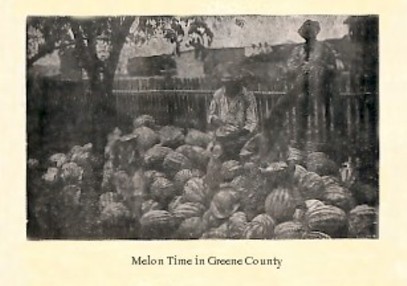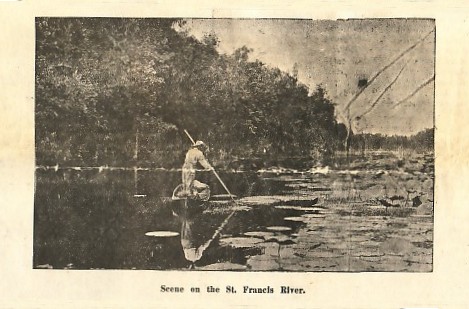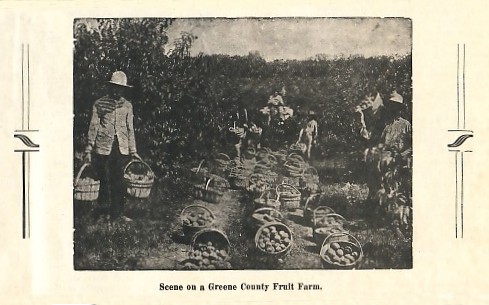Thousands of Acres of
the Best Lands
Being Reclaimed by Drainage
~~~~~~~~
INVITES HOME SEEKERS
~~~~~~~~
Paragould as a Manufacturing, Railroad and Trade
Center--Recollections of Old Times by an Old
Timer--Remarkable Career of a Pioneer Preacher
-- Side Glances at Paragould Newspapers.
~~~~~~~~~
No better literature descriptive of Greene county has ever been
printed than a pam-phlet issued a few months ago by Ben Crowley, Jr.
This pamphlet, 5000 of which were printed for distribution, makes a fair
and honest description of the county and it would be hard to improve
upon it, hence
we quote from it at length, advising anyone interested in the county to
write to Mr. Crowley for a copy of his pamphlet, which he will take
pleasure in sending. Following is the description given of the county:
Greene county was named for General
Nathaniel Greene of Revolutionary fame, and was organized in 1833, or
three years before the state was admitted into the Union. It is situated
in the northeast corner of the state, being the second
county south of the Missouri line on the north and touching that state
on the east, where the St. Francis river is the dividing line. It is
traversed by both the St. Louis Iron Mountain and Southern railway,
besides the Paragould Southeastern railroad, and the Cache Valley
railroad, the last two being, as yet, only tributary roads of the other
great systems.
Greene county has a area of five hundred and forty-four
square miles or nearly 400,000 acres of land. It has a
population of about thirty thousand white people, and is increasing
rapidly.
Nearly half of the country is bottom-land, and the soil
varies from a sandy loam to a black sand. The other portion of the
county is situated upon the famous Crowley's Ridge, an elevated plateau
of
over on hundred miles in length by from six to ten miles in width. This
beautiful ridge was named after Gen. Benjamin H. Crowley, a pioneer
citizen of the county, whose descendants still form an element in the
social, commercial and professional life of the county. This ridge
divides the county nearly equally, with the rich Cache bottoms on the
west, and the equally fertile plains of the St. Francis on the east
side of the ridge.
~~~~~~~~~
AN EQUAL CHANCE FOR ALL
While the population of Greene
Co., is virtually all white, there being less than a score of colored
people in the county at this time, and our people are from all sections
of the country, all are given an equal chance and a square deal when
they become citizens of Greene county.
At Walcott, an inland town, twenty miles from
Paragould there lives an old time darky, the only one in that section of
the county, who commands the respect of all classes of people. He is a
leading spirit in all religious gatherings, and no man has a larger
measure of the respect and confidence of the people than this old negro.
Politics, religion or nativity have nothing to do with a man's
success or failure, here. Democrats, republicans,
prohibitionists or what-not, cut no figure with our people. The
main question asked of a man is as to whether he is honest and
industrious, and these questions being settled by a brief residence, a
stranger is given a hearty welcome, and be-comes one of us.
~~~~~~~~ |
|
HEALTH
The general health of Paragould and Greene county is unusually
good, tho' the health of any locality is dependent in a very large
measure upon the occupation and care taken of the individual health. A
country where the people work outdoors nine or ten months in the year,
is
sure to have some malaria or other bodily ills. A reckless
exposure to the elements at all seasons of the year, without
proper regard for the laws of health will here, as
elsewhere,
result in sickness loss of service and some-times in death. Our
mild climate, gentle refreshing summer breezes and absence of
prostrations from excessive heat, render it
easy to keep in a normal condition and no where is there to be found more robust and superb physiques than in Greene County, Arkansas and
these are the most convincing
proofs of the healthfulness of this locality.
~~~~~~~~~~ RAINFALL AND WATER SURFACE
It is the general impression everywhere that it rains more in
Arkansas than in any state in the Union. This is only another of those
prevalent falacies not borne out by the facts. An
examination of the statistics of other sections of the country will show
that while the annual rainfall forArkansas is about thirty-six inches,
it is thirty-nine in Ohio, thirty-one in Illinois,
forty in Kentucky, and forty-two in Indiana. A general rain here extends
into these and other central states, and the annual rainfall is nearly
the same in each of them.
What is known as the rainy season here is a part of March, February
andJanuary, and is over with in time to begin farm work in the early
spring, and is precisely the same as it is in all the central and
southern states.
Closely allied to this erronious opinion about our excessive
rainfall, is the belief that a greater portion of Arkansas is under
water much of the year. Statistics show again that just sixteen states
of the Union have a greater
water surface than Arkansas, and that much of our water area is
due to our numerous broad is due to our numerous broad rivers, and
excellent springs.
~~~~~~~~~~~
ROADS AND ROAD BUILDING
Only in recent years has the subject of public roads and road
building received any attention from our people. River navigation is
abundant and cheap and the almost level condition of the country
rendered the construction of roads a matter of very little concern.
But since the country has settled up the subject
of road building has been given considerable attention and the county
now can boast of as good roads and bridges as the
average new country. Nearly all county roads have been
graded, many of them graveled a fine and inexhaustible mine of gravel
being situated in the center of the county. We have good substantial
bridges over our streams. Steel bridges of the most modern type are
taking the place of the coarse wooden structures where concrete culverts
and tile are not equal to the purpose.
As an evidence of the progress being made in road building in the
county, only last year the Commercial Club of Paragould gave a hundred
dollars for the best piece of public road in the county, and several
smaller sums for the next best road constructed or improved during the
months following the farming season. The Club has indicated
its purpose of continuing the giving of prizes during
next year, and much real good is expected to result from this kind of
encouragement. |
|
PRINCIPAL FARM CROPS
This is the ideal farm country. The climate, soil and long open
season are just what the farmer desires in order that he may
mature any kind of crop before early frosts, and two and three
crops of some kinds can be raised on the same land in one
season. This practice, however, is not very
generally followed in Greene county. The average
farmer here plants in the early spring as much grain of all
kinds as he and his
force can attend and gather and the second crop is rarely raised
upon the same land during one season. The yield is entirely
satisfactory, and the land is allowed to rest for the year.
Cotton is the money crop in Greene county. It produces well, and finds a
ready market in Paragould, Marm-aduke, Gainesville and at
Walcott. Cotton will make a half bale to a
bale and a half to the acre. A bale of cotton is reckoned at
five hundred in the seed, and is marketable in both forms. The
price of cotton both in the seed and in the bale varies greatly,
the lowest offered for seed in recent years was 2.22
to 2.25 cents, and highest was 4.10 cents; while the
lowest price ever offered for cotton on the local market was
6.15 cents and the best in recent years was something over 14
cents per pound. The average price for the crop of
the past year was nine cents. Good money can be made raising
cotton at eight cents. Cotton seed has a ready sale at about
fifteen dollars per ton, and are also highly prized as feed for
cattle. The meal and hulls after the oil is extracted make even
better food for stock. The boll weevil, so disasterous to cotton
in Texas and other sections of the south, has never appeared in
Greene county, nor do we feel any fear of the trouble reaching
here, as the nearest point to us reached by the weevil is
Sherman, Texas, about five hundred miles from Paragould.
~~~~~~~~~~
CORN
A greater acreage is cultivated in corn than in any other crop.
This yields from thirty to fifty bushels to the acre. Corn is
always in demand here and finds a ready sale at the crib for the
market price. Owing to the fact that this is a great stock
country not enough corn is grown in Greene county to supply the
local demand and buyers have to seek other markets. We need
corn-growers to increase the acreage and supply the demand.
~~~~~~~~~~~~
HAY
As a hay country this county can not be excelled.
Many kinds of grass yield abundantly such as clover, pea, red
top, timothy bermuda, blue grass, all thrive and
make a sweet and
wholesome hay. Alfalfa is in its infancy here
but where it has been tried on our bottom lands the result has
been entirely satisfactory. It is as yet not generally
cultivated, and it will
be some years before the Greene county farmers are convinced
that alfalfa can be made a profitable a crop as cotton.
~~~~~~~~~
|
|
WHEAT
AND OATS
For a number of years wheat was successfully grown in all
northeast Arkansas, but in late years there has been but little
attention paid to wheat growing. Two of the principal flour
mills were destroyed by fire a few years since, and as there has
been no local market for cereal raised in excess of home
consumption the growing of wheat has almost been
abandoned in Greene county. _ell sowing does well here, the
grain always matures to perfection and there is no reason why
all the flour consumed in Greene county can not be made at home.
There is a small flour mill at Walcott, an interior town,
which manufactures into flour the wheat grown in the immediate
vicinity which is about all the wheat now raised in the county.
The yield is from fifteen to forty bushels per acre, and the
quality is as fine as that grown any-where. Chinch bugs and the
Hessian fly, so destructive to wheat elsewhere are entirely
unknown in Greene county.
~~~~~~~~~~~~~
FRUIT GROWING
Fruit growing has proven an immense success in Greene county.
It is only a matter of time when the whole of Crowley's Ridge
will be one immense orchard, displaying
a magnificent picture of semi-tropical fruits.
The big red apple is a natural product of this section, and in
every instance where it has been brought into competitive
exhibition with other fruit in New York or San Francisco, it has
never failed to win the premium for size and quality. At the
Paris Exposition in 1900 the Arkansas apple created a mild
sensation by beating the world for size and beauty. Almost any
kind of tree will bear well here but the Ben Davis, Winesap,
Mammoth Black Twig, Arkansas Black, Shockleyand other varieties
of the winesap apple grow to the most perfect maturity in this
climate.
Peaches do well, also, the varie- ties most common being the
Elberta, the Heath, White Cling, and the Crawford varieties.
Complete fail-ures from frosts such as are experienced in the
north are unknown. The Elberta seems to be the favorite, but
other varieties grow rapidly, bear early and endure a reasonable
length of time. Of the many kinds of pears grown in the most
thrifty, though we have a native pear that is a large fruit and
a steady bearer.
Plums bear as well on Crowley's Ridge as any other fruit growing
section under the sun. The Wild Goose, Wickson, Shopshire and
Damsons are leaders. Cherries do equally as well.
Grapes prosper, especially those of the black varieties, such as
the Concord, Ives Seedling, and Moor's Early,
and the white kind, the Niagara, Prentiss and the Golden
Pocklington seem to do the best. Smaller fruits, strawberries,
rasberries and gooseberries yield abundantly.
Taking it as a whole Greene county is wonderfully adapted to the
growing |
 |

